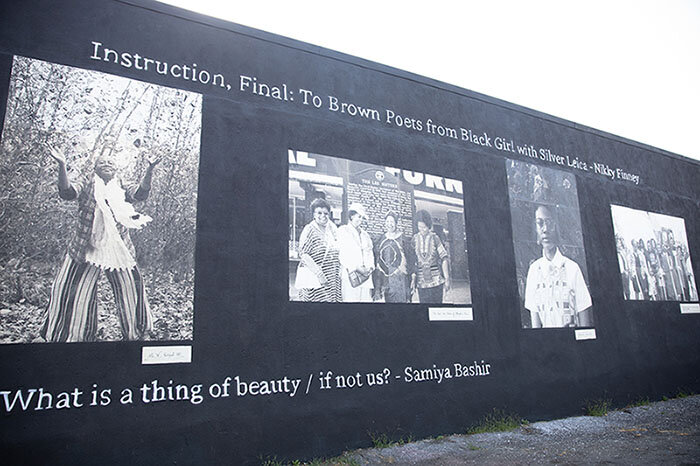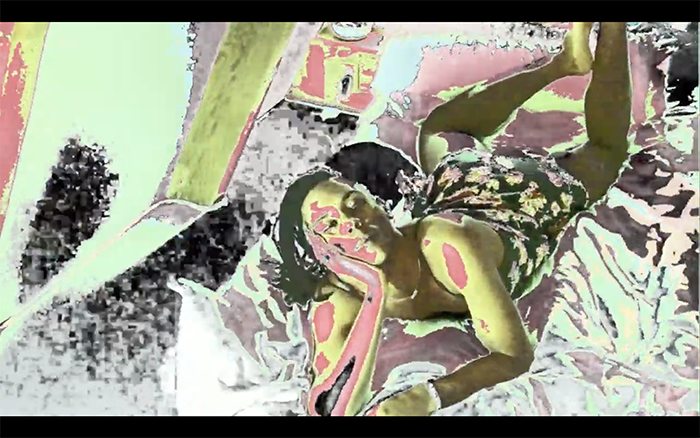ariella tai - Statement for "Antidote":
“don’t let the money make you” uses digitally manipulated images sourced from late 90s hit films “Set it Off” and “The Player’s Club” to consider both the prescribed and alternate narrative possibilities for black lesbian characters Ronnie and Cleo as they relate to alternate economies, deviancy, pleasure and resistance.
HELP TRANSGENDER PEOPLE IN HAITI
For home school's contribution to ANTIDOTE at c3, curated by the Nat Turner Project, home school co-founder manuel arturo abreu presents a selection of three videos in the vein of their current research program, the alternative history of abstraction. This program rejects the European modernist origin myth of abstraction and the western autonomous, functionless objet d'art in favor of an older, more-vetted, socially- and spiritually-embedded, functional Black and brown abstraction. (1) The titular video presents the overall proposal of the alternative history of abstraction. Two others present specific case studies: (2) of Dominican cultural worker and musician Enerolisa Núñez, and (3) of the zombie concept as a response to the Haitian Revolution.
(1) An Alternative History of Abstraction, 2020. Here, abreu heeds Suhail Malik’s call for an exit from contemporary art and its historicism by rejecting the European modernist origin myth of abstraction in favor of the long timeline of the abstract; a few examples like Muslim aniconism, West African fractal pattern, Tang-era Chinese calligraphy; and the value of an interdisciplinary approach that understands abstraction not as sublimation away from the concrete / market / functionality, but as fundamental to mundane daily life, expression, and function. The germ of abstraction is the tongue itself: as an arbitrary linkage of sound and meaning, and as a way of articulating possible worlds, language is abstraction per excellence. From strange biological and physical constraints emerges the calculating potential of electric meat, i.e. the brain, and the history of human survival inextricably depends upon the reproduction of abstract culture which constantly constructs reality while wrestling with calculation, the “irrealis” or subjunctive, and the idea of “something more” than just surviving.
(2) Dejabo del agua: the wake work of Enerolisa Núñez, 2020. With her family band, Enerolisa Núñez, the "Queen of Salve," performs Afro-Dominican religious music in the salve style, also called palo or atabales. We review some musical examples, examine the history and context of Núñez's music and palo genres generally, and explore how Núñez navigates Afro-Dominican citizenship, or "no-citizenship" as Christina Sharpe says, in a context where palo seems to move into national prominence since the 90s, but is in fact reduced to "roots" or "folklore," not recognized as retention of living African presence and resistance in the Dominican spiritual and social fabric. We analyze the specific exploitative context of Enerolisa's collaboration with Dominican musician Kinito Mendez. Despite such marginalization, practitioners like Núñez continue to work in the wake to maintain the fullness of African spirituality in the face of the antiblack specter of "brujería" in the Christian Dominican mainstream, the commemorative national and corporate use of "folkloric" music, and what Sharpe calls oceanic time - "a time that does not pass, a time in which the past and present verge." From a space under the water, Enerolisa works to heal herself and retain her family's traditions. This video was originally produced for the 2020 Black Feminist Summer School.
(3) ZOMBIE: Fear of a Black Republic, 2020. Using film footage and critical analysis, abreu analyzes the development of the antiblack zombie trope in literature, cinema, and video games from its origins in the wake of Haiti's liberation by means of vodou to its current deracialized form. In doing the work to recover the racial nature of this trope, we also learn more about the richness of Caribbean engagement with the imposed cannibal, Caliban, and zombie tropes– all iterations on the notion of "fetish," developed by Portuguese and Dutch missionaries to pejoratively describe West African material and spiritual practices that hindered their colonial endeavors and rejected their Christian materialist value systems. Likely from repressed fears of being themselves simply brainless vessels for power, as well as from titillation by the idea of flesh-consumption (projection of the Eucharist), Europeans projected onto Haitians and Dominicans the soul possession trope, based on colonial misreadings of spiritual practice and theology on the island. However, the undead kills back.
Nat Turner Project, hosted by c3:initiative,
proudly presents
ANTIDOTE,
an exhibition of four artists in two parts over the course of six months,
activating the windows of c3:initiative for an exterior facing display,
for those who choose to see.
Intisar Abioto x jayy dodd 08/28 - 10/10
ariella tai x home school 10/24 - 01/09
Intisar Abioto
Intisar Abioto (b. Memphis, TN. 1986) is a movement artist working across photography, dance, and writing. Moving from the visionary and embodied root of Blackgirl Southern cross-temporal cross-modal storytelling ways, her works refer to the living breath/breadth of people of African descent against the expanse of their storied, geographic, and imaginative landscapes. Working in long-form projects that encompass the visual, folkloric, documentary, and performing arts, she has produced The People Could Fly Project, The Black Portlanders, and The Black.
Intisar Abioto is an artist engaged in dancing, photography and writing. Her work is united by a form of story inquiry that takes as it subject the authentic stories of people within the global African diaspora. Abioto has shown her photographs of people of African descent in Oregon at venues including at Multnomah County Public Library, Powell’s City of Books, University of Oregon White Box Gallery, Portland State University Littman Gallery, and Ori Gallery. Her publication The Black Portlands documents interviews with Black Portlanders alongside her photographs. She was a contributing photographer to MFON: Women Photographers of the African Diaspora (2017) and her photographs were featured in the Urban League of Portland’s State of Black Oregon 2015. She was selected in 2018 for Oregon Humanities fellowship program Emerging Journalists, Community Stories. Abioto has a degree in Dance and has performed at Paragon Gallery, Portland Art Museum, and Disjecta Contemporary Art Center.
jayy dodd
the subject known as jayy dodd
... aka [redacted] aka Lady Tournament beamed down in Los Angeles ’92 & is now based in Portland,OR. Her professional literary career includes positions at The Offing, Winter Tangerine & more with features in Poetry Magazine, Oprah Magazine, Ms. Magazine, Willamette Weekly, The New York Public Library & several anthologies. She’s the author of Mannish Tongues (Platypus Press 2017) & The Black Condition ft. Narcissus (Nightboat 2019). Her film & performance work has been installed & screened across the country from classrooms to museums. She has been a Lambda Literary Fellow & Precipice Art Grant Recipient through Portland’s Institute of Contemporary Art. she the mother of Tournament Haus, a boutique Ballroom house in Portland Kiki Scene, where she manages & produces young Black queer & trans artists. Find her talking slick or in another dimension.
ariella tai
ariella tai is a video artist, film scholar, and independent programmer from Queens, New York. They are interested in black performance and cultural vernaculars in film, television and media studies. They are one half of “the first and the last,” a fellowship, workshop and screening series supporting and celebrating the work of black women and femmes in film, video and new media art. They have shown work at Anthology Film Archives, the Portland Oregon Women’s Film Festival, Portland Institute For Contemporary Art, Northwest Film Center, Boathouse Microcinema, Wa Na Wari, the Black Femme Supremacy Film Festival, MOCA and Smack Mellon. Their most recent video work "safehouse" premiered at Trinity Square Video in Toronto as part of group show "Architectures after the Asylum" curated by Sajdeep Soomal.
home school
home school is a free pop-up art school co-run by manuel arturo abreu and Victoria Anne Reis, in its fifth year of curriculum presenting multimedia, genre-nonconforming edutainment and creating welcoming contexts for critical engagement with contemporary art. home school has previously curated exhibitions and projects with composition, Portland; Compliance Division, Portland; S1, Portland; Portland Community College Paragon Gallery; the Cooley Gallery, Reed College, Portland; MoMA P.S. 1, NYC; the Re:Art Show, old Pfizer Factory, NYC. home school has received support from the Precipice Fund, the Andy Warhol Foundation for the Visual Arts, Allie Furlotti/the Calligram Foundation, a Rhizome Net Art Microgrant, Regional Arts and Culture Council project grants, and Yale Union.
manuel arturo abreu (b. 1991, Santo Domingo) is a poet and artist from the Bronx. They studied linguistics (BA Reed College 2014). abreu works in text, ephemeral sculpture, and what is at hand in a process of magical thinking with attention to ritual aspects of aesthetics. They are the author of two books of poetry and one book of critical art writing, the Oregon Book Awards Sarah Winnemucca creative nonfiction finalist Incalculable Loss (2018). Their writing has appeared in Rhizome, Art in America, CURA, The New Inquiry, Art Practical, SFMoMA Open Space, AQNB, etc. abreu also composes club-feasible worship music as Tabor Dark, with nine releases to date. They also co-founded and co-run home school, a free pop-up art school in Portland in its fifth year of curriculum. Recent solo and duo shows: Portland State University, Portland; Yaby, Madrid; the Art Gym, Portland; Open Signal, Portland; Institute for New Connotative Action, Seattle. Recent group shows: Superposition, LA; Veronica, Seattle; Felix Gaudlitz, Vienna; Critical Path, Sydney; Studio Museum in Harlem, NYC; NCAD Gallery, Dublin; online with Rhizome and the New Museum; Centre d’Art Contemporain, Geneva. Recent curatorial: Yale Union, Portland; Center for Afrofuturist Studies, Iowa City; SOIL, Seattle; Paragon Gallery, Portland; old Pfizer Factory, Brooklyn; S1, Portland; AA|LA Gallery, LA; MoMA PS1, NYC.
Victoria Anne Reis (b. 1982, East Meadow, NY) is trying to be a good mom and a good person. She lives with her parents and daughter, and works on a tree farm, in Boring, OR








